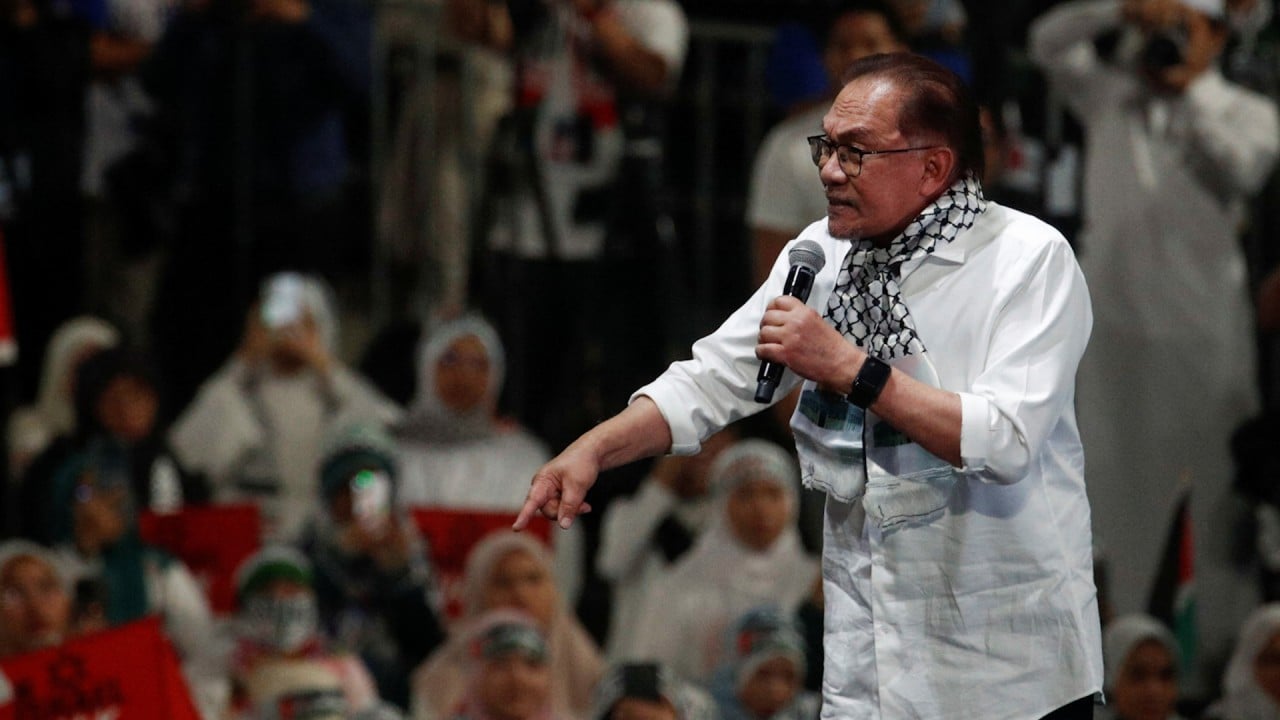
Malaysian boycotters hail win as FamilyMart says it does ‘not deal with Israel’
- FamilyMart’s parent company says it has ended a deal with Israeli defence firm Elbit Systems, adding it is against ‘supporting violence or killing’
- F&B companies such as McDonald’s and Starbucks have seen their business nosedive in Malaysia amid the anti-Israel consumer boycott
Malaysians boycotting Israel-affiliated firms have hailed another victory in their vote-with-their-feet campaign, after forcing the Japanese parent company of FamilyMart to end an agreement with an Israeli defence firm over fears of a damaging backlash in Muslim markets.
Malaysians began broadcasting calls to boycott FamilyMart after details emerged of a deal between Itochu Aviation, a subsidiary of Itochu Corporation which owns the convenience store chain, and Israeli defence company Elbit Systems Ltd.
Itochu took full ownership of FamilyMart in July 2020.
In a statement late Monday, FamilyMart Malaysia moved to head off the snowballing boycott calls, explaining the termination of the agreement between its parent company and the Israeli firm and reiterating its stance against “supporting violence or killing”.
Malaysians hit back as McDonald’s franchisee sues over Israel boycott
“FamilyMart Malaysia does not contribute to, donate to, or deal with Israel,” the company, which has over 277 stores in Malaysia, said in the statement.
The statement was loudly applauded by those who have joined the boycott campaign.
“The boycott against FamilyMart’s parent company Itochu worked!” said Malaysian game developer and streamer Wan Hazmer on X in a post seen by almost half a million people as of Tuesday.
“So there’s no need to boycott FamilyMart any more.”
YouTube and TikTok content creator Muhammad Faris, meanwhile, said the Japanese company had clearly laid out its stance by naming Israel, calling it “a solid move”.
Malaysia backs South Africa’s ICJ case against Israel’s ‘genocidal’ acts in Gaza
“They directly stated that they do not support Israel, unlike McDonald's, beating around the bush,” he said.
Others, however, noted that the agreement will only expire at the end of February, saying they will continue their boycott until that date.
“I will only step inside there in March,” a Facebook user said, commenting on FamilyMart’s official page.
Israel has resisted all calls for a ceasefire to a bloody months-long operation launched after the October 7 assault by Hamas militants on Israel, which killed over 1,000 Israelis.
On Monday, Reuters reported that Itochu plans to end the collaboration after the ICJ ordered Israel last month to prevent acts of genocide against Palestinians and do more to help civilians.
“Taking into consideration the International Court of Justice’s order on January 26, and that the Japanese government supports the role of the Court, we have already suspended new activities related to the MOU, and plan to end the MOU by the end of February,” said Itochu chief financial officer Tsuyoshi Hachimura.
Malaysia has a long history of cordial relations with Hamas and its leaders, a group labelled terrorists by Israel and its allies, but seen as legitimate freedom fighters by many in the Muslim world.
McDonald’s reported its first quarterly sales miss in nearly four years, with its businesses in Malaysia, Indonesia, and France being impacted, alongside that of the Middle East, according to CEO Chris Kempczinski in a post-earnings call on Monday.
‘We’re siblings’: Malaysia, Singapore online users slam bid to stir row over Israel
Previously a mainstay brand in Malaysia with over 320 restaurants across the country, McDonald’s has seen business halt to a trickle since the start of Israel’s military action in Gaza.
“The post-boycott recovery may not be straightforward and it may take Berjaya Food much effort to regain its market share, [given] the intense competition,” the bank’s research division said in December, adding that its market share loss might not be temporary.
Mystery deepens as wife of Sarawak ex-governor denies taking him from hospital
On January 26, the ICJ ordered Israel to prevent acts of genocide against Palestinians and do more to help civilians, although it stopped short of ordering a ceasefire as requested by South Africa, which had filed the case against the Jewish-majority state.
While the ruling denied Palestinian hopes of a binding order to halt the war in Gaza, it represented a legal setback for Israel, which had hoped to throw out the case brought under the genocide convention established in 1948 after the murder of millions of Jews by Nazi Germany in the Holocaust during World War II.
The ICJ found there was a case to be heard about whether Palestinian rights were being denied in a war it said was causing grievous humanitarian harm. It also called for Palestinian armed groups to release hostages captured in the October 7 attacks on Israel that precipitated the conflict.


